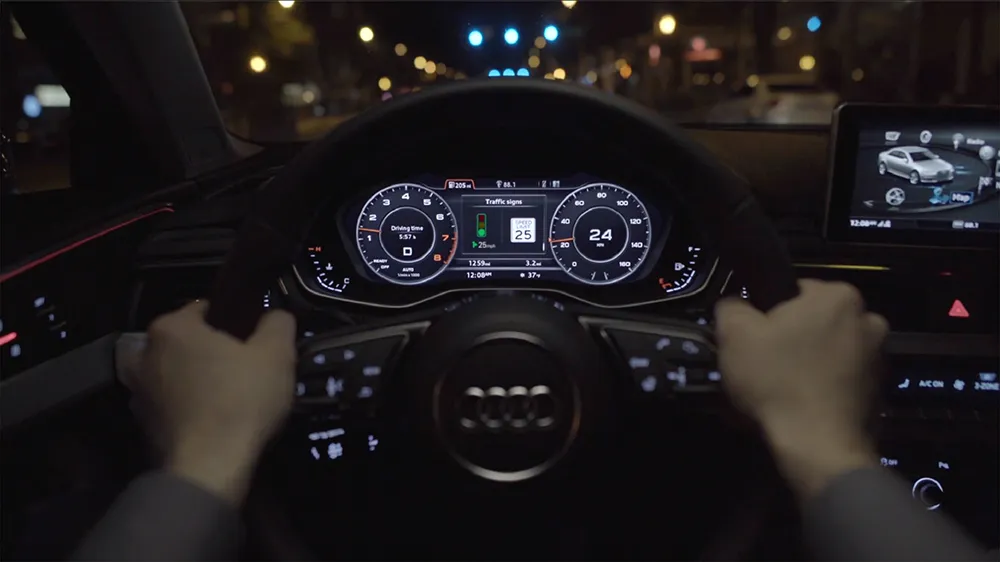After over four years of work, the European ecoDriver project has released its first results. The project trials involved 170 drivers in seven countries, France, Germany, Italy, Netherlands, Spain, Sweden and UK, both in controlled and naturalistic environments testing nine different eco-driving support systems.
Despite minor variations in terms of percentage, the findings showed that overall, across all the systems, reductions in fuel consumption and CO2 have an average of 4.2 per cent with the highest
March 17, 2016
Read time: 3 mins
After over four years of work, the European ecoDriver project has released its first results. The project trials involved 170 drivers in seven countries, France, Germany, Italy, Netherlands, Spain, Sweden and UK, both in controlled and naturalistic environments testing nine different eco-driving support systems.
Despite minor variations in terms of percentage, the findings showed that overall, across all the systems, reductions in fuel consumption and CO2 have an average of 4.2 per cent with the highest saving, 5.8 per cent on rural roads. Systems embedded systems in the vehicle were more effective than non-embedded systems, such as Apps, with fuel savings up to six per cent, against an average of 2.5 per cent non-embedded systems. EcoDriver says this difference is due to the fact that embedded systems perform better because of their integration into the vehicle whereas systems such as the App, despite being cheaper, relay mainly on GPS information.
The ecoDriver systems proved to have strong positive impacts on speed, time headway, and acceleration and deceleration, which ecoDriver believes should translate into less severe crashes. Specifically, when the ecoDriver system included an indication of the recommended green speed, the average speed was reduced by two to four per cent. A significant reduction in speed was also observed before sharp curves on rural roads when using the embedded systems.
“The results from our trials with a large range of eco-driving support systems indicate that there are substantial fuel and energy savings to be obtained when drivers are given precisely tailored advice on green speed and gear, as well as given foresight of how to drive when approaching a particular road or traffic situation,” said Professor Oliver Carsten from the University of Leeds and coordinator of ecoDriver. “These systems can make a real contribution to reducing the carbon impact of road transport as well as to saving fuel costs. The systems also deliver important safety benefits by encouraging drivers to reduce their speed.”
“Road transport contributes about one-fifth of total CO2 emissions in the EU. Advances have been made in terms of cleaner vehicles, traffic management, efficiency and intermodality, but the final link is the driver. Driving behaviour has a major influence on fuel use and emissions” Hermann Meyer,374 Ertico’s CEO said. “Projects such as ecoDriver allow us to test drivers’ behaviour in real life and represent an important contribution to increase safety on European roads while promoting eco-driving,” he continued.
Despite minor variations in terms of percentage, the findings showed that overall, across all the systems, reductions in fuel consumption and CO2 have an average of 4.2 per cent with the highest saving, 5.8 per cent on rural roads. Systems embedded systems in the vehicle were more effective than non-embedded systems, such as Apps, with fuel savings up to six per cent, against an average of 2.5 per cent non-embedded systems. EcoDriver says this difference is due to the fact that embedded systems perform better because of their integration into the vehicle whereas systems such as the App, despite being cheaper, relay mainly on GPS information.
The ecoDriver systems proved to have strong positive impacts on speed, time headway, and acceleration and deceleration, which ecoDriver believes should translate into less severe crashes. Specifically, when the ecoDriver system included an indication of the recommended green speed, the average speed was reduced by two to four per cent. A significant reduction in speed was also observed before sharp curves on rural roads when using the embedded systems.
“The results from our trials with a large range of eco-driving support systems indicate that there are substantial fuel and energy savings to be obtained when drivers are given precisely tailored advice on green speed and gear, as well as given foresight of how to drive when approaching a particular road or traffic situation,” said Professor Oliver Carsten from the University of Leeds and coordinator of ecoDriver. “These systems can make a real contribution to reducing the carbon impact of road transport as well as to saving fuel costs. The systems also deliver important safety benefits by encouraging drivers to reduce their speed.”
“Road transport contributes about one-fifth of total CO2 emissions in the EU. Advances have been made in terms of cleaner vehicles, traffic management, efficiency and intermodality, but the final link is the driver. Driving behaviour has a major influence on fuel use and emissions” Hermann Meyer,









